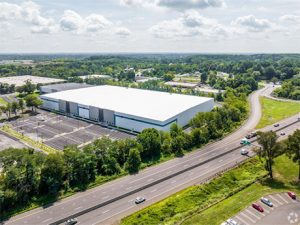From Square Footage To Smart Footage: How AI Is Transforming Logistics And Industrial Property Management
- Home
- Latest News
- From Square Footage To Smart Footage: How AI Is Transforming Logistics And Industrial Property Management

The industrial real estate and logistics sectors are undergoing a rapid transformation as landlords and tenants increasingly deploy artificial intelligence (AI) to enhance operational efficiency and maximize the utility of every square foot.
By integrating AI across facilities and portfolios, these stakeholders are raising the standard for resilience, responsiveness, and adaptability in a competitive market.
What was once a series of isolated pilot programs has matured into enterprise-level systems delivering measurable results. According to 2025 data from AI In The Chain, companies applying AI to redesign logistics flows have reported a 15% increase in operational efficiency and a 10% reduction in total logistics costs. These improvements become even more significant across large-scale portfolios.
In parallel, Worldmetrics data shows that warehouse operators leveraging AI solutions have experienced up to a 50% reduction in order-picking errors and a 40% decrease in inventory processing times—performance gains that directly improve service levels and cost control.
The demand for smart buildings is rising. CBRE’s U.S. Real Estate Market Outlook 2025 notes that industrial tenants are increasingly drawn to properties designed for robotics, AI-powered warehouse management, and high-capacity electrical systems. A case study by Oxmaint, a predictive maintenance and inventory platform, highlights a logistics company that cut unplanned downtime by 73% using AI-driven maintenance tools—resulting in significant savings and improved uptime.

One company leading this transformation is Greek Real Estate Partners (GREP). GREP has embedded AI into every facet of its property management operations. By analyzing data from maintenance requests, vendor performance, inspections, and leasing activity, the firm can detect emerging issues and opportunities early—often before they impact operations.
Each work order, inspection, and invoice feeds into the system, training it to make faster, smarter recommendations. This reduces the administrative burden on property managers, allowing them to focus on strategic decision-making and proactive asset management.
GREP has adopted Fyxt, an AI platform that transitions property management from a reactive model to a predictive, data-informed approach. Workflows such as invoice approvals, maintenance tracking, and inspections are now automated. Communication among tenants, vendors, and ownership is centralized, streamlining processes and accelerating issue resolution.
Beyond automation, AI agents within the platform extract and standardize data from documents such as leases and inspection reports. This enables instant, portfolio-wide queries—such as identifying properties with clear heights over 36 feet, tracking lease expiration notices, or monitoring warranty deadlines.
Fyxt also integrates seamlessly with ERP systems like Yardi and MRI, creating a unified audit trail for budgeting, compliance, and capital planning. The system automates insurance tracking, vendor bidding, and COI collection, while providing live dashboards for real-time visibility into performance metrics.
By standardizing key workflows and reducing human error, GREP has developed a scalable operating model that supports growth without additional headcount. The result is consistent service delivery, early identification of issues, and greater capacity to meet the evolving demands of tenants and clients.
The true power of AI, according to GREP leadership, lies not only in automation but in strategic foresight. AI helps forecast optimal timing for capital projects, aligns maintenance schedules with tenant usage patterns, and uncovers operational efficiencies that translate into measurable ROI. This shift from manual oversight to a predictive, AI-driven management ecosystem enables GREP to maintain high-performing assets and strengthen relationships with tenants and investors.
AI is rapidly becoming the backbone of modern property operations. Companies that successfully combine intelligent systems with experienced management teams are positioning themselves for long-term success—ensuring operational excellence, tenant satisfaction, and investor confidence.
Looking ahead, the next wave of innovation will be driven by AI platforms that interconnect entire portfolios—coordinating the flow of energy, labor, and materials across regions. Owners and operators who adopt AI as a core business philosophy, rather than a standalone tool, will be best positioned to lead.
GREP’s early adoption of platforms like Fyxt reflects a forward-looking approach to logistics real estate—where intelligence, sustainability, and service come together to define the future of industrial property management.
In an increasingly AI-driven marketplace, those who fail to adapt risk being outpaced by more agile, tech-enabled competitors.
Source: REBusiness
